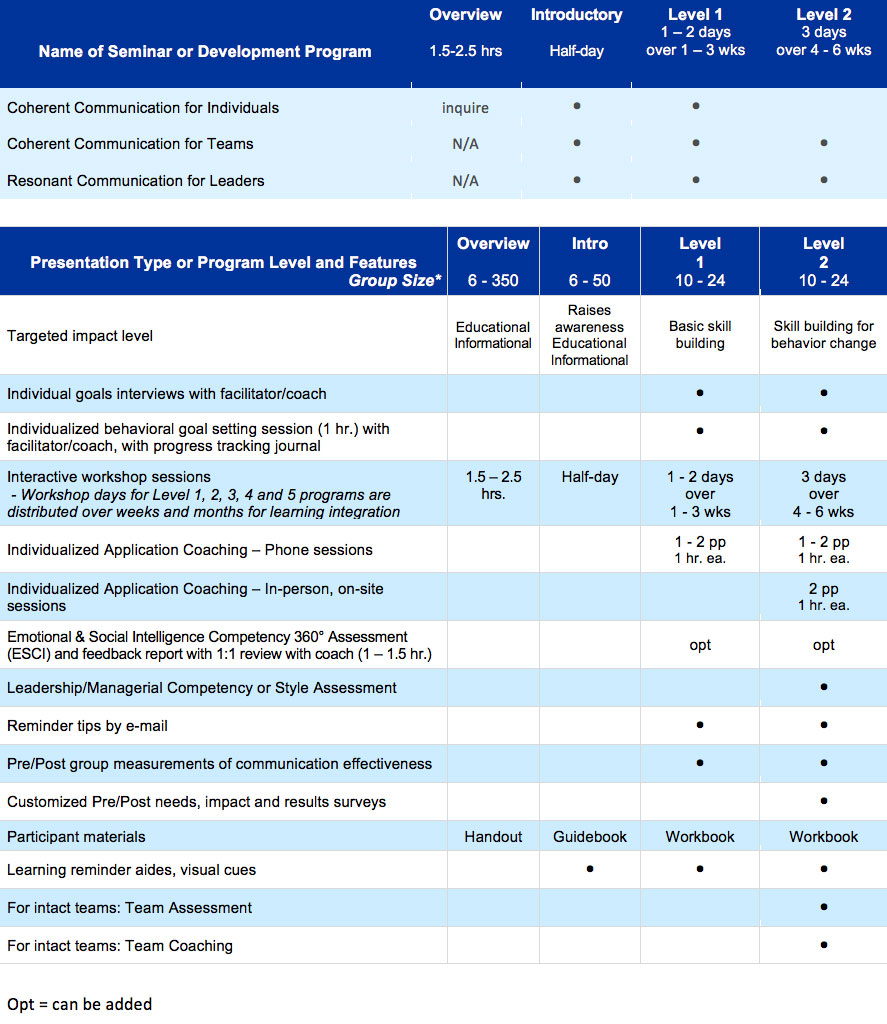Effective Communications
Companies invest millions so that their hard systems can communicate with each other.
But what about the skill level of the employees who are the central element in all communication systems?
Effective Communications
Companies invest millions so that their hard systems can communicate with each other.
But what about the skill level of the employees who are the central element in all communication systems?

Effective Communication – Coherent Communication – Resonant Communication
In today’s fast paced business environment where employees are doing more with less, efficient and effective communication is crucial to success.
Coherent Communication is communication that is genuine, effective, clear and purposeful and reduces errors.
Resonant Communication is communication that heightens the level of employee engagement, fosters teamwork and cooperation, results in valuable employee contribution, and improves customer satisfaction.
 Common blocks to effective communication:
Common blocks to effective communication:
- Emotions inhibit authenticity; fear, judgments, blame
- Withholding
- Assumptions
- No verification of meaning
- Hidden agendas
- Do not know what we really mean
- Use words that have meaning only to us
- We don’t confirm that we were accurately heard
- We don’t verify what we think we heard
- Avoidance
- Distractions
- Interruptions
What would happen if employees were trained to listen and speak at more effective levels?
Imagine the results in productivity . . . truly effective communication with co-workers, customers and business partners.
Imagine focusing entirely on purposeful communication, eliminating underlying unspoken conflicts and inner turmoils.
Effective communication begins with listening effectively.
When engaging in conversation, we often discover that we listen with half an ear while our minds expend energy preparing a response. Perhaps we disagree with the viewpoint of the person speaking, or, we see something that we believe they’re not seeing.
Are we even present to the conversation? Many people find they are thinking about the next thing that needs to be done, or their next response, and haven’t heard (consciously or unconsciously) what was being spoken.
The result is miscommunication, costly errors and unproductive conflict. And when this is the behavior of a leader, it erodes trust and rapidly contributes to employee disengagement.
“Courage is what it takes to stand up and speak;
courage is also what it takes to sit down and listen”.
–Winston Churchill

Think about the last time you helped your team decide something meaningful…
- Was there robust discussion beforehand?
- Did people understand what was being decided?
- Did everyone have an opportunity to talk?
- Did everyone feel heard?
- Were underlying assumptions identified and verified?
- Did you talk about the obvious issues as well as those that are sometimes “un-discussable” in your group?
- Did you look at multiple options to potentially solve the problem or move ahead with an opportunity?
- Did everyone walk away confident that all concerns and options had been expressed, understood and heard?
- Was there clear and accurate understanding of next steps, roles and responsibilities?
Learn and apply tools and techniques to:
- Enhance interpersonal communication by improving the ability to listen and speak effectively.
- Deal more effectively with difficult communications. Reduce procrastination in communication.
- Clarify and surface unspoken assumptions.
- Improve efficiency and reduce costly errors and wasted time due to misunderstanding, mis-communication and lack of clarity.
- Understand the impact of withheld communication.
- Improve transparency and open up the lines of communication.
- Strengthen the effectiveness of outgoing communication, including e-mail.
- Communicate more effectively, free from the distractions that block authenticity.
- Effectively communicate in a manner that encourages feedback and reduces misunderstandings.
- Hear and understand another’s point of view, even when it is different from our own.
- Understand how perceptions can diminish our ability to listen effectively.
- Increase productivity & effectiveness.
Communication Training, Workshops, Seminars


